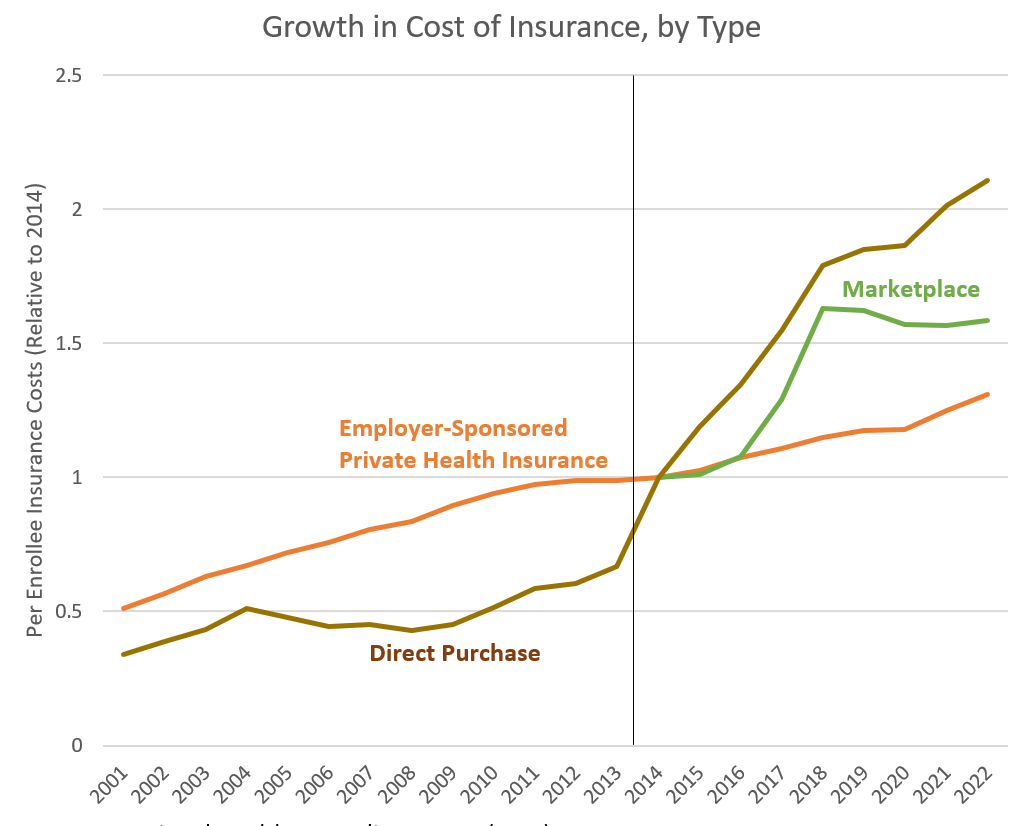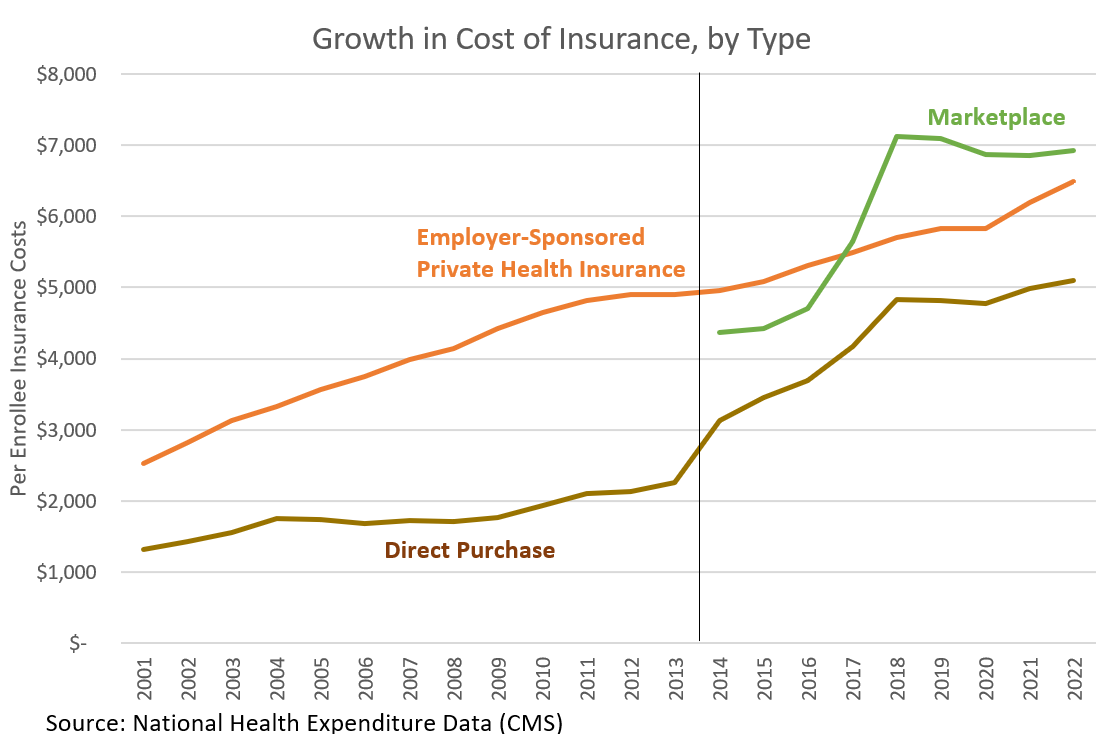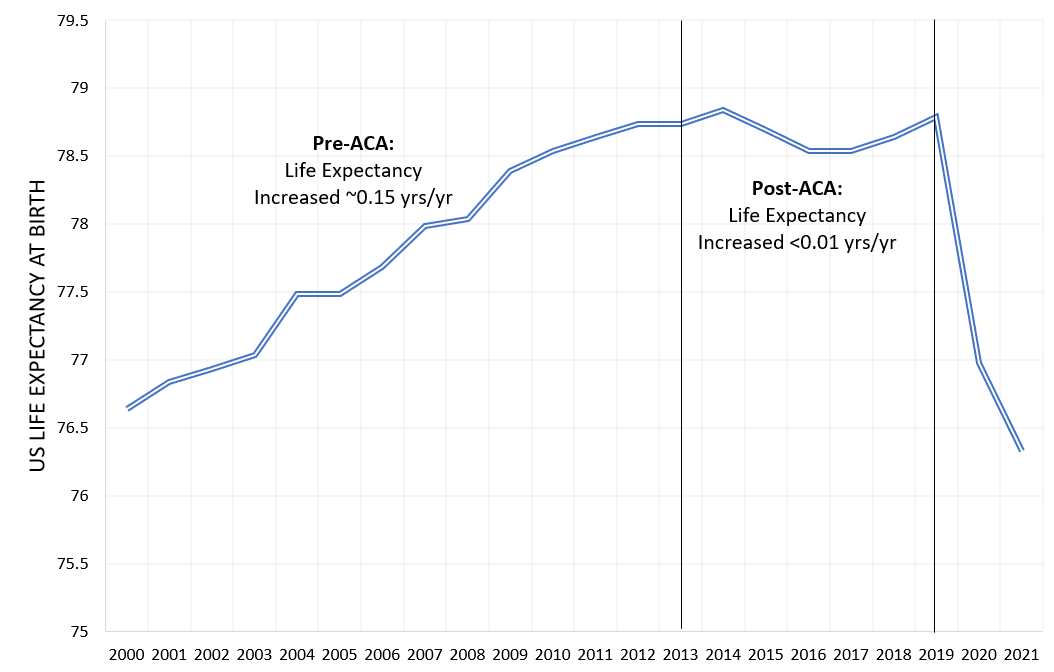It's been more than ten years since the ACA was fully implemented, and by most measures it has failed. In the 2008 election and the later part of 2009, healthcare reform was a top issue. For much of the campaign, before the financial crisis hit in mid to late 2008, it was the top issue. Candidates Obama and Clinton sparred frequently on the topic. The documentary film Sicko, Michael Moore's follow-up to his enormously popular Bowling for Columbine, and not quite as popular Fahrenheit 9/11 investigated the health care industry from many angles and served as a foundation for much of the criticism of the industry and urgency for reform.
The goals of healthcare reform were numerous. The overarching goal was to reduce the number of uninsured in the U.S. Almost as important was to reduce costs and improve outcomes. Few people have looked back at the full slate of goals of the ACA or the projections that accompanied it. Mostly, policy wonks focus on the one goal for which it was relatively effective and ignore the rest. Looking at all of the dimensions, though, and how they progressed over the past fifteen years shows that the ACA didn't solve almost any of the problems that were the biggest discussion points before the legislation even existed, and it often didn't meet the expectations set for it after it was written.
Uninsured
The primary goal of the ACA was to reduce the number of Americans who didn't have insurance. In the run-up to the legislative effort, the number of uninsured was ubiquitous in the news. While that goal was based on numbers that were greatly misrepresented (70% of the new Medicaid enrollees were eligible prior to ACA and chose not to sign up, and another large subset were illegal immigrants), even the expected reduction was never achieved.
CBO estimated that, by 2019, the number of uninsured would fall by 31 million. In reality, it fell by less than 15 million, before accounting for population growth and the booming 2019 economy. The Urban institute estimated a reduction of around 28 million.
Behind the numbers, Medicaid was expected to grow by 16 million, but it actually added 20 million more beneficiaries. The exchanges were projected to insure an additional 23 million Americans. By 2019, only 11 million people enrolled in an exchange plan.
The largest miss, and the biggest failure of the ACA is that it completely decimated the existing non-group insurance option. Before the ACA, there were approximately 15-17 million enrolled in private plans. By 2019, the combined enrollment in ACA and non-ACA plans was just under 19 million, meaning that the exchanges and subsidies did not generate much net improvement in the insurance rate because most of the ACA gains came out of or at the expense of the existing private plans.
Premiums
It's a universally acknowledged miss that President Obama promised that the ACA would "bend the cost curve down." He specifically said that the ACA would lower premiums for families by $2500/year on multiple occasions.
In 2017, Forbes published an article already calling into question this result.
Using National Health Expenditure Data provided by CMS, one can verify that the Forbes article was correct. Increases in private per enrollee costs grew faster after the implementation of the ACA. Costs for "Other Direct Purchase" which includes off-exchange plans, rose 5.4% per year from 2001 to 2013, and 8.6% per year from 2013 to 2022, after the ACA was implemented. Marketplace plans, specifically, have increased, on average 5.3% per year.

While the ACA was supposed to make insurance more affordable, the costs of insurance rose faster after its implementation compared to before. Everyone doesn't incur those costs equally, however. People who are insured through Marketplace plans may be eligible for some level of subsidy, depending on their income, which reduces the costs to them of the increased premiums. Those millions who are not eligible are now much worse off than they were before the ACA.

Costs for Exchange Plans are higher than the private, non-exchange plans
Note also that studies were done in 2013 projecting, due to experience up to then, that premiums would save even more money. Few studies have been done since, but every indication is that this was just a temporary phenomenon.
Outcomes
The most widely discussed health outcome prior to the ACA was US life expectancy. The fact that Cuba had a higher life expectancy than the US was frequently used to claim that the Cuban health care system was superior to the US's. Remarkably, since the passage and implementation of the ACA, life expectancy has improved at a much slower rate than before passage.

src: Data Commons
In addition to life expectancy, a primary goal of healthcare reform was to reorient care towards prevention and reduce emergency visits. According to CDC, the ED visit rate was unchanged between 2009 and 2019.
Conclusion
A careful review of the main healthcare challenges that were being discussed in the run-up to 2010, the problems politicians and media said would be solved shows that for every one of them, the ACA failed to solve the problem. In one case--the insurance rate--it helped, but in every other dimension--affordability, outcomes, appropriate coverage--it failed. Maintaining a rich skepticism of government's proposed solutions and their expectations cannot be emphasized enough.
Assorted Links
Obama's Broken Promises Blase - ACA and Trump RetrospectiveObama Healthcare Speech June 2009
Obama Healthcare Speech Sep 2009
Ben Bernanke Healthcare Speech 2008
Vance's statement about pre-existing conditions
New York Magazine - Vance wants to destroy healthcare
Side Comment on Using AI Resources
I'm not optimistic about ChatGPT or its competitors. There's clearly an existing internet bias towards the left, because the left produces more content. Try a google news search on a topic where you know there's a good right-leaning argument. You probably won't find it.
— Chris Oldman (@ChrisOldman4) September 27, 2024
As a side note, multiple AI chatbots said that the ACA did better at providing insurance, but wouldn't give me any source.
In addition, multiple said premiums have risen more slowly after ACA. One pointed me to this study done in 2013, before full implementation, and based on a weird metric, this study that reports individual year results, not the trend after ACA or before.

